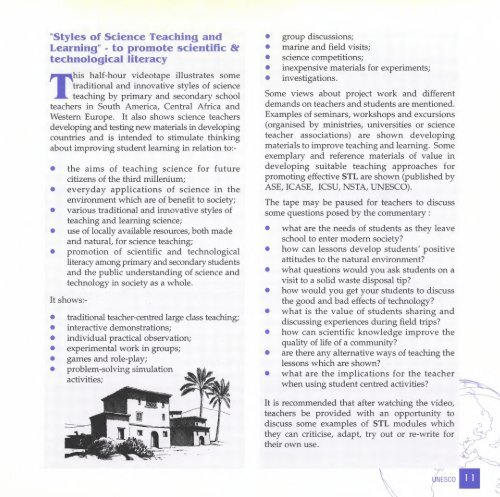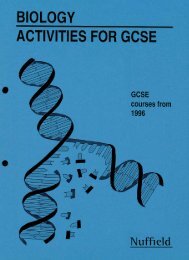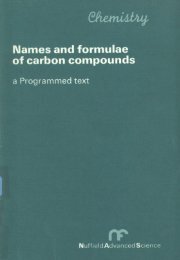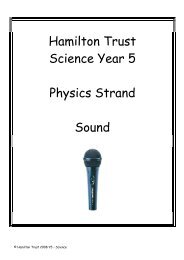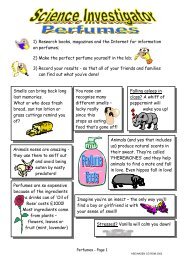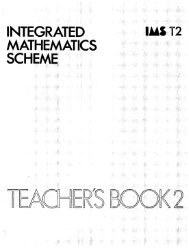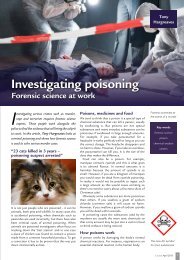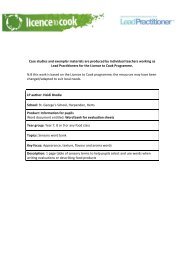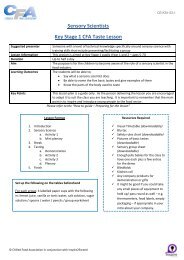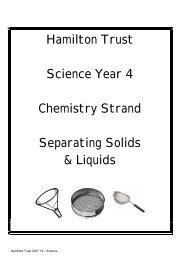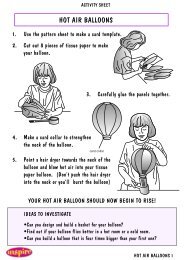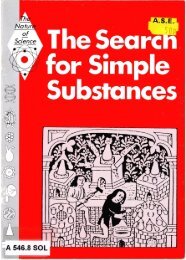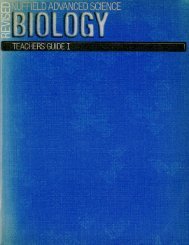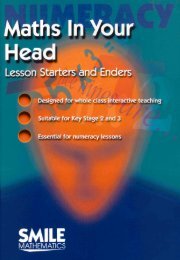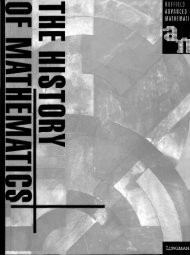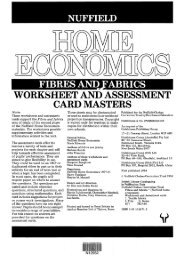UNESCO resource kit - science and technology educa...
UNESCO resource kit - science and technology educa...
UNESCO resource kit - science and technology educa...
Create successful ePaper yourself
Turn your PDF publications into a flip-book with our unique Google optimized e-Paper software.
"Styles of Science Teaching <strong>and</strong><br />
Learning" .,to promote scientific &<br />
technological literacy<br />
This half-hour videotape illustrates some<br />
traditional <strong>and</strong> innovative styles of <strong>science</strong><br />
teaching by primary <strong>and</strong> secondary school<br />
teachers in South America, Central Africa <strong>and</strong><br />
Western Europe. It also shows <strong>science</strong> teachers<br />
developing <strong>and</strong> testing new materials in developing<br />
countries <strong>and</strong> is intended to stimulate thinking<br />
about improving student learning in relation to:-<br />
• the aims of teaching <strong>science</strong> for future<br />
citizens of the third millenium;<br />
• everyday applications of <strong>science</strong> in the<br />
environment which are of benefit to society;<br />
• various traditional <strong>and</strong> innovative styles of<br />
teaching <strong>and</strong> learning <strong>science</strong>;<br />
• use of locally available <strong>resource</strong>s, both made<br />
<strong>and</strong> natural, for <strong>science</strong> teaching;<br />
• promotion of scientific <strong>and</strong> technological<br />
literacy among primary <strong>and</strong> secondary students<br />
<strong>and</strong> the public underst<strong>and</strong>ing of <strong>science</strong> <strong>and</strong><br />
<strong>technology</strong> in society as a whole.<br />
It shows:-<br />
• traditional teacher-centred large class teaching;<br />
• interactive demonstrations;<br />
• individual practical observation;<br />
• experimental work in groups;<br />
• games <strong>and</strong> role-play;<br />
• problem-solving simulation<br />
activities;<br />
• group discussions;<br />
• marine <strong>and</strong> field visits;<br />
• <strong>science</strong> competitions;<br />
• inexpensive materials for experiments;<br />
• investigations.<br />
Some views about project work <strong>and</strong> different<br />
dem<strong>and</strong>s on teachers <strong>and</strong> students are mentioned.<br />
Examples of seminars, workshops <strong>and</strong> excursions<br />
(organised by ministries, universities or <strong>science</strong><br />
teacher associa tions) are shown developing<br />
materials to improve teaching <strong>and</strong> learning. Some<br />
exemplary <strong>and</strong> reference materials of value in<br />
developing suitable teaching approaches for<br />
promoting effective STL are shown (published by<br />
ASE, ICASE, ICSU, NSTA, <strong>UNESCO</strong>).<br />
The tape may be paused for teachers to discuss<br />
some questions posed by the commentary :<br />
• what are the needs of students as they leave<br />
school to enter modem society?<br />
• how can lessons develop students' positive<br />
attitudes to the natural environment?<br />
• what questions would you ask students on a<br />
visit to a solid waste disposal tip?<br />
• how would you get your students to discuss<br />
the good <strong>and</strong> bad effects of <strong>technology</strong>?<br />
• what is the value of students sharing <strong>and</strong><br />
discussing experiences during field trips?<br />
• how can scientific knowledge improve the<br />
quality of life of a community?<br />
• are there any alternative ways of teaching the<br />
lessons which are shown?<br />
• what are the implications for the teacher<br />
when using student centred activities? ~<br />
It is recommended that after watching the video,<br />
teachers be provided with an opportunity to<br />
discuss some examples of STL modules which<br />
they can criticise, adapt, try out or re-write for<br />
their own use.<br />
NESCO


